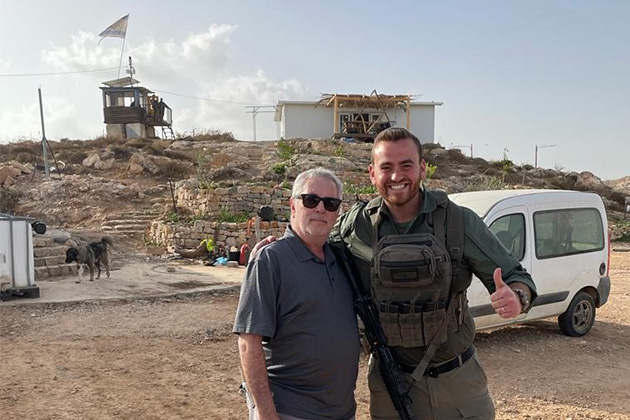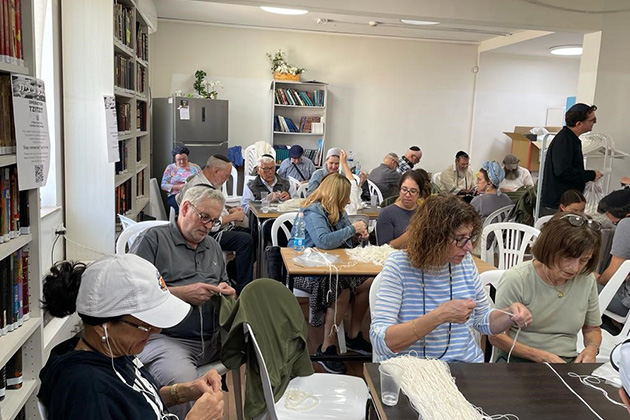Experiencing Community and the Changes that Have Taken Place
On Shabbat, the synagogue where I usually pray relocated the entire minyan to a nearby school which has a bomb shelter large enough to accommodate the entire congregation. This is fairly typical these days in Israel. In fact, the synagogues are limiting the number of congregants to 50 or less since most of the bomb shelters can only accommodate that amount. Our synagogue was able to secure the local school bomb shelter which is larger in size and, therefore, able to accommodate the entire congregation. I wondered as I walked to synagogue and thought about the situation here in Israel what kind of service I would encounter. Would it be depressing or uplifting? Would it be sad or joyous? The synagogue named Eretz Chemda means desirable land and it truly lives up to its name. People recognize that however tough the situation is, how many challenges people face, we are all united and committed to a single goal of protecting the country, our people and our freedom. The service was joyous and inspiring.
A young, recently married, man was celebrated with all the congregants dancing with him in the middle of the service and celebrating the beginning of two new lives together in the face of so much death and destruction. There was much singing and fervent prayer and I could not help but be certain that with the Jewish People's spiritual and military strength we will ultimately prevail.
Tzitzit for Soldiers of Israel: A Unique Connection
On Sunday I was privileged to spend time with a number of people -- men, women, boys and girls, the elderly and the young -- all gathered together to make tzitzit, the four cornered fringed garment that observant Jews wear as a reminder of God's presence in the world and in their lives. Apparently, the army has a stock of these religious garments, but it seems that thousands upon thousands of nonobservant soldiers have requested a pair for themselves so that they may go into battle wearing them for divine protection. The tzitzit garment is military regulation green and meets the army's requirement. It was quite a sight to behold so many volunteering their time and painstakingly weaving the strings of the tzitzit on each of the four corners of the garment to produce a 21st-century version that is identical to those worn by Jewish men for thousands of years. The satisfaction that the civilians in the room got from participating directly in the war effort was profoundly inspiring.
The Meaning Behind Tzitzit in Jewish Tradition
Rooted in the Torah (Numbers 15:38-39), tzitzit serve as a physical reminder for Jews to recall God’s commandments and presence, each knot and twist a symbol of devotion woven into daily life for thousands of years. Traditionally a symbol of faith, tzitzit have taken on new significance as thousands of nonobservant IDF soldiers request them, seeking divine protection as they face battle. This act of weaving threads into a garment unchanged for millennia binds civilians and soldiers together in a shared mission. This isn’t just tradition; it’s a lifeline linking past to present, civilian to soldier, in a shared resolve to safeguard their people and land. The Jewish National Fund-USA stepped in to amplify this effort, supplying thousands of these army-compliant garments to meet the overwhelming need. Through their support, JNF-USA transformed a grassroots movement into a powerful wave of solidarity, ensuring soldiers could carry this spiritual armor into battle.

Resilience in Every Region
Later that day, I had the opportunity to travel to the large city of Efrat on the outskirts of Jerusalem. The city is large enough that it merits its own army security force and I was driven around by one of the members who also happens to be associated with the Just One Chesed Organization which provides a myriad of services to the poor, the elderly, lone soldiers, and now displaced persons from the Gaza Envelope, as well as providing many items, ranging from bulletproof vests to tourniquets for the soldiers in the field.
JNF’s Support for the Frontlines
I had the great honor of spending some time with a number of IDF soldiers at the Army Watchtower Post that oversees the community with state-of-the-art equipment along with their own human intelligence. To a man, each soldier was grateful and thankful for all of that the American Jewish community is doing. Many of them were very aware of JNF-USA's work in the Gaza Envelope and in the southern part of the country.They are very impressed with the work JNF-USA is doing and expressed their thanks. It was very clear to me that the IDF is ready and knows what is at stake. There is literally no option, but total victory and these young and brave men and women will do everything possible to achieve that goal.
JNF’s Footprint Nationwide
Learn more and donate to our Israel Resilience Campaign
Thank you to David Pollack, a civilian volunteer from New York, for sharing his experiences in Israel this past week.


